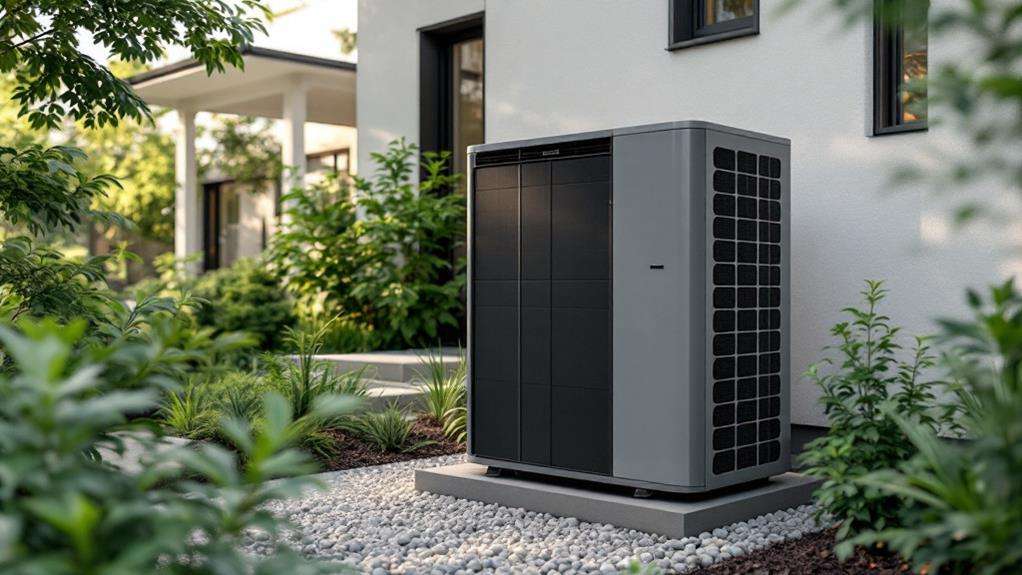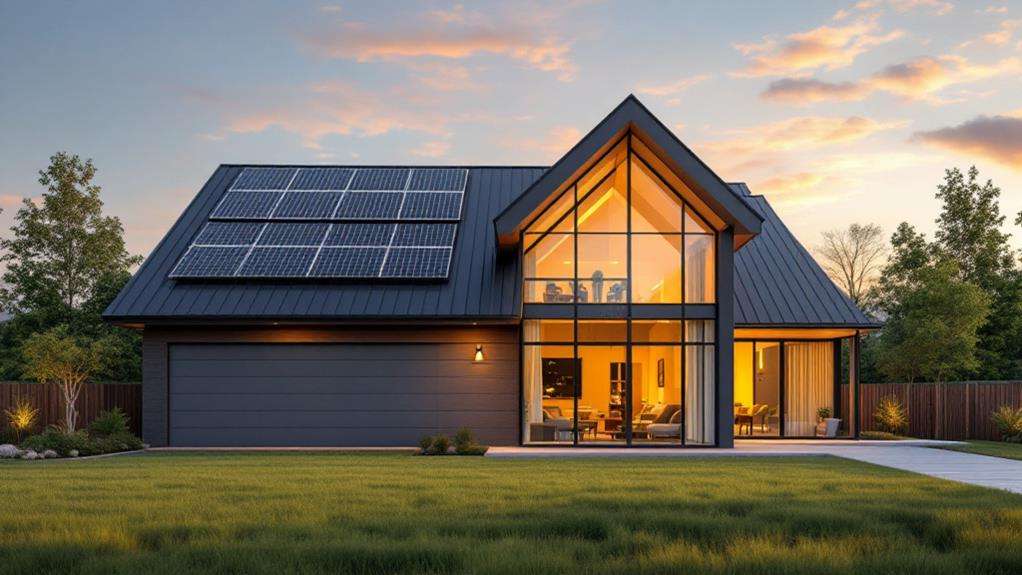Energy-Efficient Heating Systems for New Home Builds
When building a new home, you'll want to explore high-efficiency furnaces with multi-stage or modulating capabilities for precise temperature control. Boiler systems offer quiet operation, easy maintenance, and impressive energy efficiency. Heat pump technologies like ductless mini-splits and geothermal systems can also significantly reduce your energy consumption and carbon footprint. Be sure to size your heating system properly, maximize efficiency ratings, and consider sustainable options like radiant floor heating. Balancing upfront investment with long-term cost savings is key when choosing the right energy-efficient heating solution for your dream home. There's more to discover about these advanced heating systems.
Key Takeaways
- Consider multi-stage or modulating furnaces with higher AFUE ratings for precise temperature control and greater fuel-to-heat conversion.
- Explore boiler systems for their quiet operation, easy maintenance, precise temperature control, and impressive energy efficiency.
- Investigate ductless mini-split systems or geothermal heat pumps to reduce energy consumption and lower the carbon footprint.
- Ensure the heating system is properly sized for the home and complemented by energy-efficient insulation for maximum efficiency.
- Evaluate sustainable heating options like radiant floor heating and passive solar design to enhance energy efficiency and environmental friendliness.
High-Efficiency Furnace Options
When considering high-efficiency furnace options for your new home, you'll find a range of energy-saving choices. One option is a multi-stage furnace, which can adjust its heating output to match your home's needs, improving efficiency and comfort. These furnaces operate at lower capacities during milder weather, using less fuel, and ramp up to higher stages during colder periods.
Another choice is a modulating furnace, which can continuously adjust its output to maintain your desired temperature. This technology provides even more precise temperature control and can result in significant energy savings compared to traditional single-stage furnaces. Modulating furnaces also tend to have higher AFUE (Annual Fuel Utilization Efficiency) ratings, meaning they convert a greater percentage of their fuel into usable heat.
When selecting a high-efficiency furnace, consider the multi-stage or modulating features, as well as the AFUE rating, to ensure you choose the most energy-efficient option for your new home.
Advantages of Boiler Systems
Another energy-efficient heating option for your new home is a boiler system. Boilers offer quiet operation, making them a great choice if you value a peaceful living environment. Unlike noisy furnaces, boilers use hot water or steam to distribute heat, resulting in a much quieter experience. Additionally, boiler systems are known for their easy maintenance, requiring less frequent servicing compared to traditional furnaces. This can save you time and money in the long run. Boilers also provide precise temperature control, allowing you to maintain a comfortable and consistent indoor climate throughout your home. Furthermore, many modern boiler models boast impressive energy efficiency, helping to lower your utility bills and reduce your carbon footprint. When it comes to energy-efficient heating solutions for your new home, a boiler system is definitely worth considering for its reliable performance, quiet operation, and hassle-free maintenance.
Exploring Heat Pump Technology

Aside from boiler systems, heat pump technology offers another energy-efficient heating option for your new home. Heat pumps work by transferring heat rather than generating it, making them highly efficient. Ductless mini split systems are a popular heat pump option, as they don't require extensive ductwork, making them ideal for homes without existing air ducts. These systems consist of an outdoor compressor unit and one or more indoor air handling units, providing targeted heating and cooling where you need it most.
Geothermal heat pumps are another heat pump technology worth considering. These systems tap into the stable underground temperatures to heat and cool your home, offering exceptional efficiency. They use a network of buried pipes to transfer heat, making them a great choice for homes with available land. Both ductless mini splits and geothermal heat pumps can significantly reduce your energy consumption and carbon footprint compared to traditional heating systems, making them a smart investment for your new home.
Evaluating Heating System Efficiency
Evaluating a heating system's efficiency is crucial when selecting the right option for your new home. Your heating load requirements will determine the size and capacity needed to heat your space effectively. Look for systems that boast high efficiency ratings, as these will consume less energy and save you money in the long run. Complementing an efficient heating system with energy-efficient insulation is key. Proper insulation will reduce your heating needs, allowing you to select a smaller, more cost-effective system. When comparing options, pay close attention to the Annual Fuel Utilization Efficiency (AFUE) rating, which measures a system's overall efficiency. The higher the AFUE, the more energy-efficient the system. Additionally, consider the system's ability to distribute heat evenly throughout your home. Uneven heating can lead to comfort issues and wasted energy. By carefully evaluating efficiency factors, you can find the ideal heating solution to keep your new home cozy and your energy bills low.
Cost-Saving Considerations

In addition to evaluating a heating system's efficiency, cost-saving considerations are equally important when selecting the right option for your new home. After all, the upfront installation expenses and ongoing utility costs can significantly impact your overall budget.
When weighing your heating system choices, be sure to factor in the initial investment required. While more energy-efficient models may have a higher sticker price, they'll likely pay dividends in the long run through reduced monthly utility bills. Carefully review the projected operating costs for each system to determine the best value.
Additionally, consider any installation or labor fees that may be associated with the different heating options. Some systems may be more complex to set up, requiring additional time and expertise from the contractor. Opt for a straightforward, user-friendly solution to minimize these upfront costs.
Sustainable Heating Choices
While energy efficiency is crucial, sustainable heating choices can also significantly contribute to a home's environmental impact. Consider radiant floor heating - it distributes heat evenly and efficiently, reducing energy waste. This system uses less energy than forced-air furnaces, making it a smart, eco-friendly option.
Passive solar design is another sustainable approach worth exploring. By strategically placing windows and leveraging natural light, you can harness the sun's rays to warm your home. This approach reduces the need for artificial heating, cutting your carbon footprint. Plus, passive solar design enhances your home's aesthetic, creating a bright, airy atmosphere.
When designing your new home, don't overlook the importance of sustainable heating choices. Radiant floor heating and passive solar design can help you create an energy-efficient, environmentally-friendly living space that's comfortable and cost-effective in the long run.
